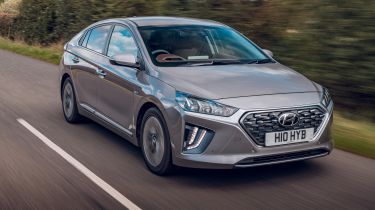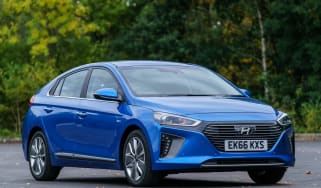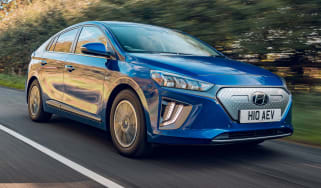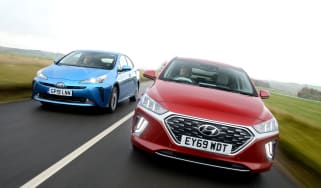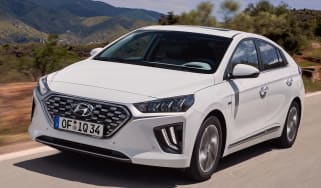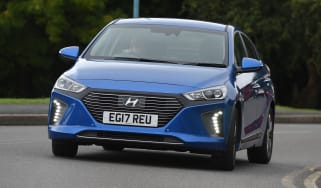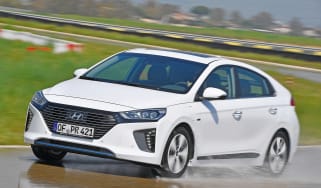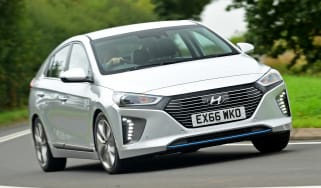Hyundai Ioniq (2016-2022) review
Impressive specs and the choice of hybrid, PHEV and EV models make the Ioniq a serious rival for the Toyota Prius

Hyundai’s first attempt at a full-on eco car family is a strong one. The Ioniq comes in hybrid, plug-in and full electric forms, and all three offer plenty of practicality at an affordable price with lots of kit. However, the electric motor and petrol engine in the hybrid variants aren’t integrated as well as in the Toyota Prius, and the car isn’t as comfortable, either.
On the other hand, Hyundai’s infotainment set-up is more impressive and if efficiency on a budget is your main aim, the Ioniq is a great alternative to the Prius. On top of that, the amount of standard equipment is very generous, while the cabin is more conventional and easier to get along with day-to-day.
Hyundai has transformed itself over the years from a bucket-shop brand to a manufacturer offering impressively competitive cars, from the smallest city runabout like the i10 to the full-size Santa Fe SUV.
It also covers most sectors in-between, and the Hyundai Ioniq arrived in 2016 as an eco-focused rival for the Toyota Prius and Nissan Leaf. As such, the Korean maker offers a full-house of hybrid, plug-in hybrid and fully electric options.
A facelift in 2019 saw minor exterior styling upgrades with an updated grille and lights, and a more significant interior overhaul which introduced a large, impressive-looking and comprehensively-featured tablet-style touchscreen on the centre of the dash. The plug-in (PHEV) and electric (EV) versions have also received powertrain upgrades, keeping them competitive on technology and range in an increasingly busy segment.
Used - available now

2020 Skoda
Superb
43,459 milesAutomaticDiesel1.6L
Cash £13,900
2022 Mercedes
A-Class Saloon
59,586 milesAutomaticPetrol1.3L
Cash £15,200
2022 Mercedes
A-Class
42,730 milesManualDiesel2.0L
Cash £13,800
2020 Ford
Kuga
26,827 milesManualDiesel2.0L
Cash £15,400As well as the Toyota and Nissan, the Ioniq PHEV faces competition from the likes of the Kia Niro SUV which shares the Ioniq’s running gear, plus a diverse range of others such as the Mercedes A250 e, MINI Countryman PHEV and Ford Kuga PHEV.
The Ioniq EV is also up against a constantly enlarging roster of potential rivals, including the Kia e-Niro, Mini Electric, DS3 Crossback E-Tense, Peugeot e-2008, VW e-Golf, BMW i3 and Renault Zoe, which all offer zero-emissions electric drive at prices not too far distant from the Hyundai’s.
The cheapest Ioniq is the standard ‘self-charging’ hybrid model. It has a 1.6-litre direct injection petrol engine mated to an electric motor and small-ish onboard battery, all coupled to a six-speed DCT twin-clutch gearbox.
The Ioniq PHEV variant shares the standard hybrid’s engine and motor, but a significantly bigger 8.9kWh battery means you can drive for up to 39 miles in EV mode before you need to plug it in for a recharge.
Finally, the Ioniq EV features an improved 100kW electric motor and a 38.3kWh battery to give a claimed maximum range of 193 miles.
From the outside, the three Ioniqs share the same shape, but there are subtle differences between them. The big giveaway to the EV version is its blanked-off grille insert up front, but the hybrid versions are largely indistinguishable from each other.
How much does the Hyundai Ioniq cost?
Like other Hyundai models, the Ioniq is offered in Premium and Premium SE, while the standard hybrid is also available in SE Connect guise, which gives the range a starting price of around £23,800 – the Premium model is around £2,000 extra. There's a price jump of around £7,000 to both the PHEV and EV - the Plug-in Car Grant now only applies to the full EV version, which levels out the prices.
Engines, performance and drive
To all intents and purposes, the hybrid and plug-in hybrid have the same powertrain – with a total of 139bhp from the four-cylinder petrol engine and electric motor – which means that both offer decent performance. The plug-in is slightly quicker, but the big difference is that this version has a bigger battery, which can be charged from the mains, bringing a big increase in its electric-only range and a big drop in its CO2 emissions.
In the regular hybrid, the Hyundai’s six-speed DCT auto does a decent job of making the most of the in-gear shove, too. Holding it in fifth and sixth is where the electric motor’s 170Nm of torque helps, because when the engine revs are low, the boost from the battery pack and motor ensures the Ioniq feels brisk enough in a straight line.
The petrol engine is always quick to cut in, even on a light throttle. Although Hyundai claims the car will hit 75mph on electric power alone, in reality it’s difficult to coax the Ioniq along at this speed without the petrol motor intervening. The torque fill from the hybrid system is more noticeable off the line, where the instant shove effortlessly gets the Ioniq’s 1,370kg body moving.
When the 1.6-litre unit does chime in, it’s relatively refined. But as in the Toyota Prius, if you ask for maximum performance, the noise from under the bonnet becomes more intrusive. The gearbox’s six ratios mean the Ioniq feels more like a conventional car to drive, and although it’s a dual-clutch unit, it doesn’t shift with the snappiness you might expect from such a transmission. It’s mostly smooth enough, although we did experience a few jerks and shunts from the gearbox around town in EV mode. At least the punchy EV performance means quick getaways are okay.
It’s relaxing to run around in EV mode, but the steering isn’t quite as nice as the Toyota’s because the weightier set-up feels more resistant to your inputs. The regenerative braking also isn’t quite as polished, with a little more jerkiness when stopping. Neither is perfect due to the lack of feel from the pedal.
You can run the plug-in Ioniq in a couple of modes, but most of the time will be spent in the hybrid setting, mixing electric and petrol power as it sees fit. It's worth noting, though, that the Ioniq PHEV is keener to stick with pure-electric motoring than the conventional hybrid. Despite this, you'll still notice the engine kicking in quite regularly – not least because it's not the most polished of transitions.
EV mode forces the car to ignore the petrol engine altogether for as long as possible. In theory, at least, this would allow you to complete the bulk of a longer journey using the petrol engine, and then switching to silent running in EV mode for the final few miles in an area where noise or emissions are more heavily controlled. In practice it works pretty well, although the 60bhp electric motor doesn't have the punchy shove that you'd get a in a pure-electric car.
The Hyundai doesn’t drive as sweetly as a Toyota Prius, though. Its ride is too firm, with the wheels springing back harshly over lumps and bumps; the Prius is smoother over the same surfaces. Also, the Ioniq isn’t as comfortable as its Japanese rival because the chassis feels more unsettled and nervous compared with the more forgiving Toyota. There’s also more road noise in the Ioniq.
There's a fair amount of body roll if you throw the car at a corner, but you'll find that a pretty unsatisfying exercise. That's because, while the steering is accurate enough, it is also desperately short on communicating what the wheels are doing. Tricky brake pedal modulation – perhaps the hardest part of a hybrid set-up to master – completes the picture, leaving you with a car that's comfortable to drive, but not in the least bit rewarding.
The Ioniq electric has received a bit of a refresh with a bigger 38.3kWh battery and an increase in range from 174 miles to a claimed 193 miles. Driving the Ioniq remains a fairly dull experience, and you’re never in any doubt that this is a vehicle designed for efficiency above all else.
Engines, 0-60 acceleration and top speed
The hybrid version of the Ioniq is one of three powertrains on offer. A fully electric model and plug-in hybrid version complete the lineup.
The extra weight of the bigger battery in the revised all-electric model means that, despite an increase in power, the headline performance figures remain largely similar to before; 0-62mph takes 10.2 seconds (or 9.9 in Sport mode), although the 395Nm of instant torque means that the Ioniq is quick to respond as you pull away from traffic lights and out of junctions.
The plug-in hybrid model uses a 1.6-litre 4cyl petrol-electric powertrain with 139bhp. It increases the all-electric range over the standard hybrid with a bigger 8.9kWh battery pack, and improves efficiency in the process. When we tested the plug-in version, it accelerated from 0-60mph in 9.1 seconds, helped by the electric motor’s torque boost off the line. This instant shove from the electric motor meant the Ioniq’s in-gear figures were also strong, accelerating between 50-70mph in top gear in 13.2 seconds, showing the extra oomph delivered by the battery and motor set-up.
MPG, CO2 and running costs
The Ioniq is all about efficiency, and Hyundai makes some big claims concerning the model's potential economy and efficiency figures. The manufacturer states that all versions of the standard hybrid are capable of nudging over 60mpg, with emissions between 102g/km and 105g/km of CO2, depending on the chosen equipment level.
For the plug-in hybrid, Hyundai claims a pure-EV range of around 39 miles, but you'll do well to get about two thirds of that total in real-world motoring. The official fuel economy figure of around 256mpg is pretty unrealistic, too, although with regular charging this could still be a very efficient commuter car - with it only taking around 2.25 hours for a full top-up using a home wallbox.
The full-electric Ioniq is now able to cover a maximum 193 miles on a single charge. With Hyundai moving from a 6.6kW on-board charger to a 7.2kW system, the time it takes to top up the battery to 100% (from a 7kW home wallbox) is now just over 6 hours.
To help maximise efficiency Hyundai fitted an aluminium bonnet and boot, as well as lightweight suspension components, which saved around 25kg over conventional items.
When it comes to efficiency, every gram counts, so stripping mass out of a car boosts fuel economy and lowers CO2 emissions. However, the welcome benefit is that lighter cars also handle and perform better; while the Ioniq won’t set your pulse racing, the chassis is relatively capable.
Insurance Groups
Insurance premiums for the Hyundai Ioniq should be fairly affordable, with the entry-level SE Connect hybrid placed in group 11. The plug-in model in top Premium SE spec sits in group 12, while the full electric version in the same trim is a little higher at group 17.
Depreciation
After three years and 36,000 miles, the Ioniq is expected to keep around 46% of its original value. The standard hybrid models fare a little better than average at between 47-51%, with the full electric cars not holding on to their value quite as well with around 42% retained over the three year period.
To get an accurate valuation on a specific model check out our free car valuation tool...
Interior, design and technology
Designing a hybrid from a clean sheet of paper (as Hyundai has done) allows designers to put big emphasis on aerodynamic efficiency to extract the best possible fuel economy. There’s not much point in maximising mpg from the drivetrain if a slab-like body shape with lots of drag undoes your hard work.
This much is obvious from the Ioniq’s styling, as the curving roofline and some clever aerodynamic details give it a slippery shape.
A car’s drag coefficient relates to the resistance created moving through the air; this is what designers strive to minimise, and in the Ioniq’s case, it’s a low 0.24. Actually, this is the same as the figure for the Toyota Prius, so it’s no surprise that these cars bear a striking resemblance to one another. The Ioniq’s low nose, gentle roofline and high, square tail give a similar look in profile, while both models feature a bar across the back dividing the large glass hatches.
The C-shaped LED running lights make it easy to pick the car out on the move, while a hexagonal grille connects the two sleek light units. A contrasting colour insert at the base of the bumper gives scope to personalise the car, with seven different colours to choose from.
At the rear, the bar that divides the boot lid also acts as a brow for the tail-lights and dark glass panel, while a glossy black plastic insert in the bumper breaks up the smooth surfaces at the back. Small 15-inch alloy wheels are standard, although optional 17-inch alloys are available.
Sat-nav, stereo and infotainment
Equipment levels are pretty good all round, with Premium SE models getting plenty of kit. Heated and ventilated leather seats are included, along with adaptive cruise control and automatic wipers.
Since the facelift in 2019 all versions have been upgraded with an impressive new infotainment set-up, based around a big 10.25-inch touchscreen set on top of the redesigned dash. It’s an impressively configured set-up, but while other manufacturers have been moving towards buttons for climate control functions, Hyundai has bucked the trend and swapped formerly user-friendly scroll wheels for touchscreen controls.
Still, the touchscreen is a technology fest that puts the Prius somewhat to shame, and features a screen you can customise with a variety of widgets for functions such as climate, smartphone, navigation and audio controls. It’s also connected to the cloud, so you can get traffic info and live updates for charge point availability.
A BlueLink smartphone app has fun features that allow you to send nav destinations to your car, or pre-set the climate control remotely, as well as updating you on the charge state of PHEV and EV versions.
While there are no question marks over kit, there are a few over the build quality. The blue accents lift the sombre cabin, but some of the materials highlight the Ioniq’s cheaper price tag. The interior design is also more conventional than the Toyota’s, with the energy flow meter in the digital instrument cluster the only visual clue to the hybrid powertrain.
Practicality, comfort and boot space
The 443-litre boot puts the Ioniq ahead of the Toyota Prius in terms of load space. This small advantage is helped by a lithium-ion battery pack underneath the rear bench that has allowed Hyundai’s engineers to maximise luggage room.
However, it’s not quite as large as the Toyota with the rear seats folded, offering 1,505 litres compared with 1,558 litres in the Prius, although most people will benefit more from the roomier five-seat layout.
A space-saver spare wheel comes as standard, so the underfloor boot storage is limited. However, with plenty of trinket trays, cubbies and cup-holders – as well as good-sized door bins – storage is a match for the level of passenger space on offer.
Dimensions and size
At 4,470mm long, 1,820mm wide and 1,450mm tall, the Ioniq is a little larger than a Toyota Prius and it shows in its more spacious boot.
Leg room, head room & passenger space
Space in the back is decent enough, but the aerodynamic shape of Ioniq does limit headroom slightly. Those over six feet tall may feel their heads brushing against the roof – the more boxy Nissan Leaf offers more space inside.
Boot space
For a hybrid, the Ioniq has a surprisingly spacious load area, which measures in at 443 litres. Because Hyundai has located the batteries beneath the rear seats rather than under the boot floor, the Ioniq is the most spacious hybrid on the market when it comes to load capacity. The electric model isn’t quite as spacious, with a 350-litre boot, and the PHEV has the smallest boot of the lot; but, it still has a useful 341 litres - about the same a small family hatchback.
Reliability and safety
Hyundai has ensured the Ioniq is packed with safety kit, including seven airbags, autonomous emergency braking, adaptive cruise control and lane keeping assist all as standard, while blind-spot detection, lane follow assist and a rear cross traffic alert are offered on Premium SE versions.
Euro NCAP tested the Ioniq in 2016 and awarded it a full five stars for safety. Adult and child protection scored 91 per cent and 80 per cent, respectively.
The Ioniq finished down in 65th place (out of 75 cars) in our 2022 Driver Power customer satisfaction survey, although Hyundai itself managed 11th spot (out of 29 brands) in the manufacturer ratings.
Warranty
Another huge selling point of the Ioniq is its five-year, unlimited mileage warranty. Alongside that class-leading cover, Hyundai will also throw in a 12-year anti-perforation warranty for the bodywork.
Servicing
Hyundai offers customers their Service Plan option, which helps to manage fixed maintenance costs. You can configure your service plan based on the model and age of your car, your mileage and plan duration. These details are then used to determine the cost of your plan, bearing in mind recommended service requirements and any necessary MOTs.
